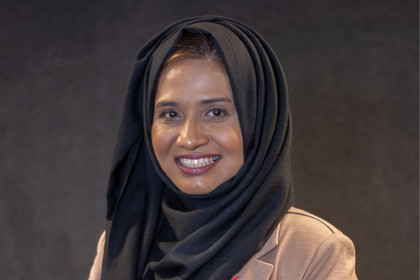Faculty Profile – Master of Education (MEd)
Discipline Lead – Faiza Qureshi
Faiza Qureshi is the Discipline Lead for the Master of Education portfolio at Murdoch University Dubai and has previously also served as Discipline Lead for the Foundation program from 2019 to 2025. She also chairs the Learning and Teaching Committee, which includes chairing Murdoch University Dubai’s annual Learning and Teaching Conference. She lectures full-time in the Master of Education and Graduate Certificate in Education programs, with a teaching portfolio that includes education policy analysis, pedagogy in culturally diverse contexts, teaching methodologies, and research in education. She also serves as the Discipline Lead for the key TLC101 (Communication Skills for Undergraduate Study) unit, overseeing its delivery for all Diploma students.
In addition to her academic responsibilities, she serves as an Associate Editor of the Journal of Applied Learning and Teaching and is a member of a number of higher education academic boards. She is currently pursuing a PhD in Education at Murdoch University (Australia) and holds a Master of Education from Murdoch University (Dubai), a Diploma in English from the University of London (UK), and the ICELT qualification from Cambridge (UK). She is also a Senior Fellow (SFHEA) and Associate Fellow (AFHEA) of Advance HE (UK).
With more than 15 years of experience across the education sector in the UAE, Saudi Arabia, and Pakistan, she has held senior leadership and academic positions in both school and higher education sectors. She is actively engaged in the Scholarship of Teaching and Learning (SoTL) and educational research, with a particular focus on transnational education, and contributes regularly to peer-reviewed journals. She has also served on the editorial board of an ELT journal, co-authored an ESL textbook, and published creative works of fiction. In addition, she has previously served as Vice Principal of a school and continues to contribute to educational development through her membership on school stakeholder committees.


